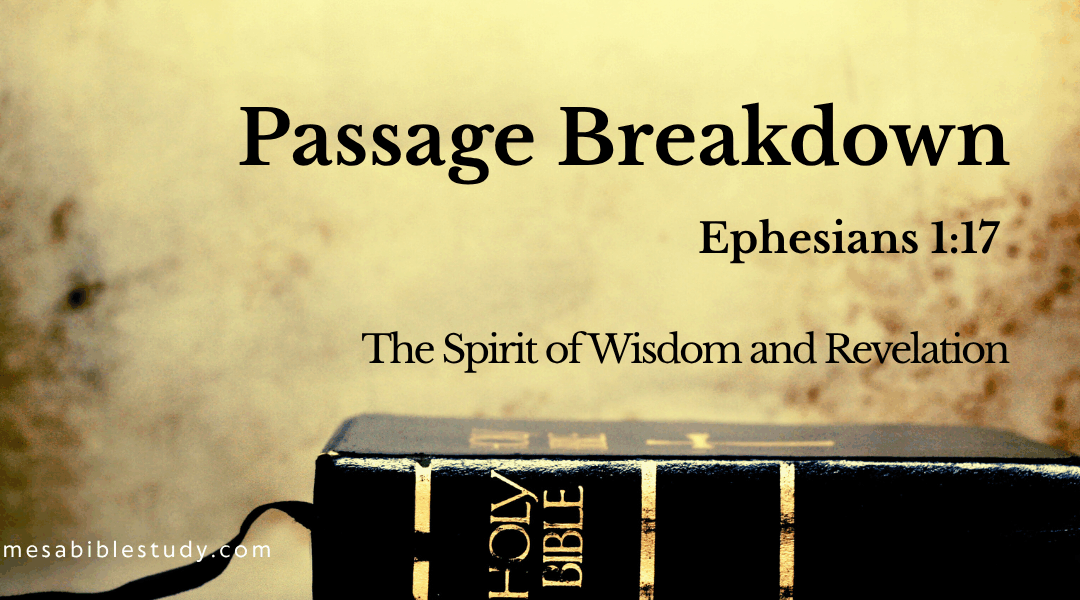
by Jamie Pantastico | Nov 9, 2025 | Passage Breakdown, Romans |
📖 Passage Breakdown — Ephesians 1:17 — The Spirit of Wisdom and Revelation
📜 Background, Setting & Purpose
✍️ Author:
The Apostle Paul, writing under divine inspiration.
👥 Written To:
The saints at Ephesus—and by extension, all members of the Body of Christ (Ephesians 1:1).
⏲️ When:
Around A.D. 60–62, during Paul’s imprisonment in Rome.
🌍 Setting & Purpose:
Paul’s letter to the Ephesians is a revelation of the believer’s heavenly calling and position in Christ. It unveils the mystery of the Church—the Body of Christ—and the spiritual blessings freely given by grace.
In this section (Ephesians 1:15–23), Paul records one of his most profound prayers. He doesn’t pray for material blessings, but for spiritual understanding—that believers might grasp what God has already given them in Christ.
💡 Context & Flow of Paul’s Prayer
When you reach verse 15 and read, “Therefore I also…”, Paul is linking his prayer to everything he wrote in verses 1–14. I was taught long ago that whenever you see a “therefore” in Paul’s letters, always ask, “What is it there for?”
It’s there because of the incredible truths Paul just revealed—truths about the will of God, our position in Christ, redemption through His blood, and the sealing of the Holy Spirit. These doctrines are so profound, so divine, that Paul prays God the Father would give believers a spirit of wisdom and revelation—so that we might truly grasp them.
Paul knew that only the Holy Spirit can enlighten the believer’s heart to understand these spiritual realities. We can read the words, but only the Spirit can reveal their depth. That’s why Paul prays—not for new blessings—but for illumination, that we might know the One who has already blessed us with every spiritual blessing in the heavenly places (Ephesians 1:3).
🔍 Ephesians 1:17
“That the God of our Lord Jesus Christ, the Father of glory, may give to you the spirit of wisdom and revelation in the knowledge of Him.”
✨ Phrase-by-Phrase Breakdown
“That the God of our Lord Jesus Christ…”
- This phrase highlights the distinct relationship within the Godhead: Jesus, in His humanity, fully submitted to the Father’s will.
- Paul’s prayer begins with reverence—recognizing that all revelation and wisdom come from God the Father.
- This title emphasizes Christ’s mediatorial role and His glorified position at the Father’s right hand (Philippians 2:9–11).
“…the Father of glory…”
- God is the source and fountain of all glory—both His own and the glory He shares with believers.
- He is not only glorious but the origin of all glory. This reminds us that every insight or illumination we receive is for His glory, not ours (1 Corinthians 1:31).
“…may give to you the spirit of wisdom and revelation…”
- Paul isn’t asking for new truth to be revealed, but that believers would understand what has already been revealed.
- “Spirit of wisdom” refers to divine insight—the ability to see things as God sees them.
- “Revelation” refers to the unveiling of truth through the ministry of the Holy Spirit (1 Corinthians 2:10–12).
- This is the believer’s continual need: not more information, but illumination by the Spirit.
“…in the knowledge of Him.”
- The Greek word for knowledge (epignōsis) means deep, precise, experiential knowledge.
- Paul’s prayer is not for head knowledge, but heart transformation through knowing Christ personally.
- The more we understand who He is, the more we understand who we are in Him.
❌ What This Passage Does Not Mean
- It does not imply that revelation today equals new doctrine or prophecy.
- It does not suggest that believers lack the Holy Spirit—they already have Him (Ephesians 1:13–14).
- It does not mean we seek mystical experiences, but rather spiritual understanding of God’s Word.
✅ What It Does Mean
- God desires every believer to grow in spiritual understanding and intimacy with Christ.
- The Holy Spirit enlightens the eyes of our heart (v. 18) so we can comprehend God’s grace and calling.
- True knowledge of Christ brings stability, maturity, and worship.
🙏 Devotional Summary
Paul’s prayer should be our daily desire: that we would know Christ—not just know about Him, but know Him intimately.
The same Spirit who inspired Scripture now illuminates it for those who belong to Christ. Our understanding deepens not by striving, but by yielding to the Spirit of wisdom and revelation.
When we begin to see who Christ truly is—the Head of the Body, the fullness of God in human form—it changes everything about how we live, think, and worship.
“That the God of our Lord Jesus Christ, the Father of glory, may give to you the spirit of wisdom and revelation in the knowledge of Him.”

by Jamie Pantastico | Oct 19, 2025 | Daily Encouragement, Passage Breakdown |
📖 Passage Breakdown — Galatians 3:11–12
“But that no one is justified by the law in the sight of God is evident, for ‘the just shall live by faith.’ Yet the law is not of faith, but ‘the man who does them shall live by them.’”
Galatians 3:11–12
📜 Background, Setting & Purpose
✍️ Author
Paul the Apostle.
👥 Written To
The churches of Galatia—primarily Gentile believers who were being influenced by Judaizers insisting that faith in Christ wasn’t enough for salvation and that they must also keep the Law of Moses.
⏲️ When
~AD 49–55, one of Paul’s earliest letters.
🌍 Setting & Purpose of Galatians
Paul writes to confront false teachers who were corrupting the gospel of grace by adding law and works. The entire theme of Galatians is that believers are not under law but under grace—and the apostle Paul, the apostle to the Gentiles, drives that truth home throughout this powerful letter.
The problem arose when Judaizers—Orthodox Jews who believed the gospel of the kingdom preached by Jesus, Peter, and the eleven—began infiltrating Paul’s grace-based assemblies. They taught that Gentile believers must be circumcised and obey the Law of Moses to be saved.
Their message was rooted in the gospel of the kingdom—that Jesus was indeed Israel’s promised Messiah who would defeat their enemies and establish the long-awaited earthly kingdom. But when these men from the Jerusalem church began adding law to grace, Paul—under the Lord’s direct command—stood in bold opposition.
His confrontation with the Jerusalem leadership was epic. Paul declared, by divine revelation, that salvation is by faith alone in Christ alone, apart from the Law or any works.
The setting is no different in Galatians 3:11-12.
✨ Verse-by-Verse Breakdown
Galatians 3:11 — “But that no one is justified by the law in the sight of God is evident…”
- Paul makes it unmistakably clear—no one can be justified (declared righteous) by keeping the Law.
- You might fool people into thinking you’re righteous by outwardly keeping religious rules—but you will never fool God.
- God sees the heart, not performance. The Law exposes sin; it doesn’t erase it (Romans 3:20).
“…for ‘the just shall live by faith.’”
- Quoted from Habakkuk 2:4, this principle has always been true.
- Faith—believing God and taking Him at His Word—is the only basis for righteousness.
- Paul is emphatic: “The just shall live by faith.” That’s it. Nothing after that.
- Salvation is faith alone in the gospel alone—Christ’s death, burial, and resurrection (1 Corinthians 15:1–4).
Galatians 3:12 — “Yet the law is not of faith…”
- Law and faith are two completely different systems.
- The Law says “do and live”; faith says “believe and live.”
- The two cannot mix—Law demands perfection, faith rests in Christ’s perfection.
“…but ‘the man who does them shall live by them.’”
- Quoted from Leviticus 18:5. The message is clear:
If you’re going to depend on the Law for salvation, you’d better keep it perfectly—from birth to death.
- So you want to work for your salvation? Then you need to keep the whole Law without failing once (James 2:10).
- That’s why we must stop and ask:
“Am I trying to obtain salvation by some kind of works religion?”
When you add anything to faith, it becomes religion—man’s attempt to earn favor with God.
Religion says, “Do this and you’ll live.”
Grace says, “It’s done—believe and live.”
There’s no comparison between the two. Religion always demands, but grace always gives.
True biblical Christianity says, “You do nothing—because God has done it all.”
❌ What These Verses Do Not Mean
- They do not mean faith cancels morality or obedience; rather, salvation is by faith alone, and obedience flows from salvation—not for it.
- They do not suggest the Law was evil; it served to show mankind’s inability to meet God’s standard.
✅ What They Do Mean
- No one has ever been justified by keeping the Law.
- The just live by faith—alone, apart from works or rituals.
- Faith and Law cannot coexist as a system of salvation.
- Christianity is not religion—it’s grace.
🔗 Cross-References
- Romans 3:20 — “By the deeds of the law no flesh will be justified…”
- Galatians 2:16 — “…a man is not justified by the works of the law but by faith in Jesus Christ…”
- Romans 10:4 — “For Christ is the end of the law for righteousness to everyone who believes.”
- James 2:10 — “For whoever shall keep the whole law, and yet stumble in one point, he is guilty of all.”
🙏 Devotional Summary
Galatians 3:11–12 draws an eternal line between faith and works.
The Law says “do,” grace says “done.” The Law condemns, grace justifies.
Maybe you can fool people by Law-keeping, but you will never fool God.
Salvation has always been—and will always be—by faith alone in Christ alone.
When you rest in Christ’s finished work, you are no longer striving to earn what He freely gives.
Religion says, “Try harder.” The gospel says, “It is finished.”

by Jamie Pantastico | Sep 9, 2025 | Daily Encouragement, Passage Breakdown |
📜 Background, Setting & Purpose
✍️ Author:
Paul the Apostle to the Gentiles
👥 Written To:
Timothy, Paul’s son in the faith, and by extension the body of Christ.
⏲️ When:
Around AD 66–67, during Paul’s second Roman imprisonment—shortly before his martyrdom.
🌍 Setting & Purpose of 2 Timothy:
Paul’s final letter is a farewell charge to Timothy, urging him to remain faithful in the face of false teaching, persecution, and apostasy. The letter is deeply personal, yet it also serves as a broader warning and encouragement to all believers.
Chapter 3 describes the perilous times of the last days, marked by wickedness and rebellion against God. In verse 12, Paul highlights the unavoidable reality that those who live godly lives in Christ Jesus will face persecution.
🔍 2 Timothy 3:12
“Yes, and all who desire to live godly in Christ Jesus will suffer persecution.”
✨ Phrase-by-Phrase Breakdown
“Yes, and all…”
- This is not limited to Timothy, pastors, or missionaries.
- Paul universalizes the statement—all believers who truly desire to live godly lives.
“…who desire to live godly…”
- To “live godly” means to live set apart from the world, walking in obedience and holiness.
- Godliness flows from the Spirit, not self-effort.
- The desire itself shows a heart aligned with Christ.
“…in Christ Jesus…”
- This is key: persecution comes because of our union with Christ.
- To be “in Christ” is to share in His rejection by the world (John 15:18–19).
“…will suffer persecution.”
- Not might, but will.
- The persecution may vary: ridicule, slander, rejection, loss of reputation, even imprisonment or death.
- The source: the world system under Satan, which opposes Christ and His truth.
❌ What This Passage Does Not Mean
- It does not mean believers should seek persecution or be reckless.
- It does not mean every Christian will suffer the same degree of persecution.
- It does not mean God abandons His people in persecution—He strengthens and delivers according to His will.
✅ What It Does Mean
- Godliness is incompatible with the world system; opposition is guaranteed.
- To live faithfully for Christ means to share in His rejection.
- Persecution is not a sign of God’s displeasure but evidence of being aligned with Christ.
- Endurance in persecution testifies to the reality of the believer’s faith and the sufficiency of God’s grace.
🙏 Devotional Summary
Paul’s words in 2 Timothy 3:12 are sobering: the path of godliness is not a rose-petaled pathway. It is marked with opposition, hardship, and persecution. Why? Because the world hates Christ, and to be in Him is to share in His rejection.
Yet this verse is also deeply encouraging. It reminds us that persecution is not random or meaningless—it is evidence of our identity in Christ (Philippians 1:28). Just as He was despised and rejected, so too will His people be. But just as He overcame, so shall we.
To desire to live godly is to walk the narrow road with Christ—knowing the world may hate us, but God has promised never to leave us.

by Jamie Pantastico | Jul 12, 2025 | Daily Encouragement, Passage Breakdown |
A devotional breakdown of David’s wilderness worship
📘 Background & Context
Author: David
Written To: The Lord, but preserved as a model of personal worship for Israel (and now the Church)
Date: Likely written during David’s time in the Judean wilderness, fleeing either Saul (1 Samuel 23) or Absalom (2 Samuel 15)
Circumstances: Isolated, pursued, and physically worn—but spiritually clinging to God with deep love and devotion
Psalm 63 is not a cry for deliverance—it is a confession of desire. David, exiled and in danger, longs not for safety or vengeance but for the presence of God. These first eight verses overflow with intense personal devotion, revealing a man who treasures God above everything else.
🔍 Verse-by-Verse Breakdown
Verse 1
“O God, You are my God; Early will I seek You; My soul thirsts for You; My flesh longs for You In a dry and thirsty land Where there is no water.”
- A personal, covenantal confession: “You are my God.”
- “Early will I seek You” reveals priority and pursuit.
- The wilderness is real, but so is David’s spiritual thirst.
- His soul and body ache—not for comfort, but for fellowship with God.
Verse 2
“So I have looked for You in the sanctuary, To see Your power and Your glory.”
- David recalls the manifested glory of God in the tabernacle.
- Now, away from the sanctuary, he longs to behold God spiritually—not a place, but a Person.
Verse 3
“Because Your lovingkindness is better than life, My lips shall praise You.”
- “Better than life” – David values God’s covenant love above survival.
- His lips respond to this truth—not with complaint, but with praise.
Verse 4
“Thus I will bless You while I live; I will lift up my hands in Your name.”
- Worship is a deliberate act of the will.
- “Lift up my hands” shows surrender and reverence to the character of God (“Your name”).
Verse 5
“My soul shall be satisfied as with marrow and fatness, And my mouth shall praise You with joyful lips.”
- Though in physical need, David experiences spiritual abundance.
- Worship flows from this inner satisfaction in God.
Verse 6
“When I remember You on my bed, I meditate on You in the night watches.”
- Quiet, watchful hours of the night become times of holy reflection.
- David fills his mind not with fear, but with thoughts of God’s character and works.
Verse 7
“Because You have been my help, Therefore in the shadow of Your wings I will rejoice.”
- David remembers past deliverance—and rests in God’s continuing care.
- “Shadow of Your wings” conveys protection, like a mother bird over her young.
Verse 8
“My soul follows close behind You; Your right hand upholds me.”
- David clings to God—not in strength, but in desperation.
- Yet he knows it is ultimately God’s right hand that holds him secure.
✨ Devotional Summary
Even in isolation and affliction, Psalm 63:1–8 models a heart that clings to God above all else.
David doesn’t seek relief—he seeks relationship.
He doesn’t cry for vengeance—he cries for communion.
He isn’t trying to escape hardship—he’s learning to be satisfied in God alone.
This is what it looks like to love God with your whole heart, even when everything else is stripped away. His soul clings. His lips praise. His spirit rejoices.
Psalm 63:1–8 is a living, breathing expression of Deuteronomy 6:5:
“You shall love the Lord your God with all your heart, with all your soul, and with all your strength.”
Deuteronomy 6:5
David doesn’t just write about loving God—he embodies it in real-time, in a desert, while on the run for his life.
- His heart: “O God, You are my God… My lips shall praise You.”
- His soul: “My soul thirsts for You… My soul follows close behind You.”
- His strength: “My flesh longs for You… I will lift up my hands…”
Even in exile, even in isolation, David loves the Lord with everything he has. This is the kind of worship that pleases God—not ritual or routine, but a soul that treasures the Lord above life itself.
🕊️ “Your lovingkindness is better than life…”
Do you believe that too?

by Jamie Pantastico | Jul 10, 2025 | Passage Breakdown |
📘 Passage Breakdown: Romans 8:3
Author: Paul
Written To: Gentiles in Rome (and some Jews)
Date: Around AD 56
Purpose/Context: Paul is explaining how God accomplished what the Law could not—victory over sin through Jesus Christ. Romans 8 builds on the tension of chapter 7, where Paul wrestles with the power of sin and the inability of the flesh to produce righteousness.
📖 Romans 8:3
“For what the law could not do in that it was weak through the flesh, God did by sending His own Son in the likeness of sinful flesh, on account of sin: He condemned sin in the flesh,”
1. “For what the law could not do in that it was weak through the flesh…”
✍️ Meaning:
- The Law of Moses is holy, just, and good (Romans 7:12), but it could not save or make someone righteous.
- It was “weak through the flesh” – meaning that the law depended on sinful human ability to keep it.
- “Flesh” here refers to the fallen, sinful nature inherited from Adam (see Romans 5:12).
- The problem wasn’t with the law itself—it was with us, because we are born with a nature that rebels against God.
💡 In other words:
The law could command righteousness, but it couldn’t empower it. Because of the weakness of human nature, the law only revealed sin—it couldn’t remove it.
2. “God did by sending His own Son in the likeness of sinful flesh…”
✍️ Meaning:
- Since the law couldn’t save, God took the initiative to do what the law could not.
- He sent His Son—this speaks of the incarnation, that Jesus came from heaven, not from Adam.
- “In the likeness of sinful flesh” is precise:
-
- Jesus came as a real man—He had real human flesh.
- But the word “likeness” protects the truth that He was without sin (Hebrews 4:15).
- His body was fully human, but not sinful in nature—He did not inherit Adam’s sin.
💡 In other words:
Jesus came looking like any other man, subject to hunger, weakness, and pain, yet without the inner corruption of sin that all other humans carry.
3. “On account of sin…”
✍️ Meaning:
- Jesus was sent “on account of sin”—this refers to the reason for His coming: to deal with our sin.
- This is not referring to His sin (He had none), but ours—the sin of the world (John 1:29).
- It means that His death was a sin offering—He came to take the full penalty for our sin (2 Corinthians 5:21).
💡 In other words:
Jesus was sent specifically to deal with the sin problem that we inherited and committed. He came to rescue us because of our sin.
4. “He condemned sin in the flesh.”
✍️ Meaning:
- “He” = God the Father.
- “Condemned” = to pass sentence against, to punish, to judge as guilty.
- “In the flesh” = in Jesus’ human body.
- At the cross, God poured out His wrath on sin—not on us, but on His Son.
- Jesus bore our judgment in His flesh, and in doing so, God condemned sin itself—He dealt with it fully and finally.
💡 In other words:
At the cross, sin was judged once and for all in the person of Jesus. This satisfied God’s justice and freed us from sin’s penalty and power.
✅ Summary:
Romans 8:3 shows the total inability of the law to save us, because of our fallen nature. But what the law couldn’t do, God did—by sending His sinless Son in a real human body, to be a substitute for our sins. On the cross, God condemned sin—He passed judgment on it in Christ, so that believers are no longer condemned (Romans 8:1).
‘For He made Him who knew no sin to be sin for us, that we might become the righteousness of God in Him.’
II Corinthians 5:21




